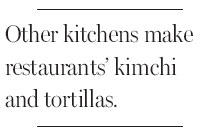|
When food items are too popular or too hard to make, New York restaurants turn to commercial kitchens, like Ko-Am Food for kimchi. Librado Romero / The New York Times |
The cognoscenti like to know the source of their food. But some dishes have sources that are hard to find, that are not farmed or fished but made from scratch, and not in gigantic factories owned by Dole or General Foods.
Around New York City, those include Chinese roasted ducks at the East Ocean Palace in Queens; kimchi at the Korilla BBQ food truck; tortillas at Dos Toros Taqueria in Manhattan; and pao de queijo, puffs of Brazilian cheese bread, at Casa in Greenwich Village.
None of these specialties are made on the premises. Despite their place on menus, they are turned out in commercial kitchens in New York and New Jersey that are large but little known.
Restaurants outsource these foods because they are labor-intensive or require special equipment or skills, and because they are so popular they must be produced in bulk, like pao de queijo.
"You need a machine to beat the dough; it's really hard," said Jupira Lee, the owner of Casa, which sells 300 of the golf-ball-size breads every week. So Ms. Lee buys them frozen from Ki Delicia, a brand of Brazilian Specialty Foods in North Bergen, New Jersey. Its president, Getulio Santos, said he sells the bread to 15 of the 30 or so Brazilian restaurants in New York City.
Making kimchi is the province of a specialist, said Yun H. Park, president of two Ichiumi restaurants that serve Japanese and Korean food, buys 180 kilograms of traditional pogi kimchi weekly from the Ko-Am Food Corporation in Queens. If he makes his own, he has to hire specialists. "One salary is well over $500 a week," he said.

What stops restaurants from roasting their own ducks is often the need for two-meter-high ovens that get as hot as 400 degrees Celsius. East Ocean Palace is one of a half-dozen businesses that buy ducks from Corner 28, a restaurant in Queens that roasts hundreds daily.
"Restaurants pick up here, and they reheat it," said Alan Gao, the manager of Corner 28. The kitchen roasts 240 to 280 ducks each weekday, 300 on weekends.
Nearby at Ko-Am Food, Soon Bo Lee, 63, directs the cooking. She learned how to make kimchi at age 16 in Seoul, "because a woman, before she's married, must learn how to make kimchi," said Sang Jin Kim, Ko-Am's president.
Mrs. Lee and her staff make 10 types of kimchi, mostly from cabbage (1,225 kilograms a day) but also from daikon and cucumbers. The vegetables are cut by hand.
The Korilla BBQ food truck sells bulgogi tacos with pogi kimchi, said Edward Song, a founder of the truck. It buys 110 kilograms of Ko-Am's kimchi weekly.
Tortilleria Nixtamal in Queens is a restaurant well known for tortillas made from masa, a dough of dried white corn that has been boiled and soaked in slaked lime and water, which softens the corn. The corn is then finely ground for tortilla dough.
Most tortillas in New York City are made from powdered masa harina, which has preservatives and is less tasty, said Zarela Martinez, a cookbook author.
At Nixtamal, "it's 3,000 tortillas an hour, 6,000 to 12,000 tortillas a day, 7 days a week, 365 days a year," said Fernando Ruiz, who opened the restaurant in 2008.
Akhtar Nawab, an executive chef at La Esquina in Manhattan and Cafe de La Esquina in Brooklyn, buys tortillas from Nixtamal. "They're flaky," he said, "like a fine French pastry but a more peasant construct, and they have pockets of air, and they smell of corn."
The New York Times
(China Daily 01/15/2012 page11)
